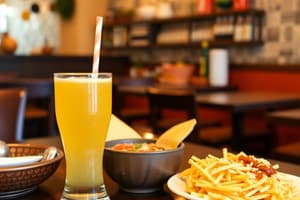Podcast
Questions and Answers
What does saying 'it's on' imply when making plans with a friend?
What does saying 'it's on' imply when making plans with a friend?
- You need more time to decide.
- You have scheduled it. (correct)
- The plan is uncertain.
- The plan has been canceled.
When someone says 'that's funny' but is not laughing, what do they actually mean?
When someone says 'that's funny' but is not laughing, what do they actually mean?
- They are being sarcastic.
- They think it's a coincidence. (correct)
- They find it comical.
- They are mocking the situation.
What does 'I got you' indicate in a conversation about payment?
What does 'I got you' indicate in a conversation about payment?
- You have already paid.
- You forgot your wallet.
- You owe them money.
- You will pay for them. (correct)
What does 'jump on the freeway' mean in casual conversation?
What does 'jump on the freeway' mean in casual conversation?
If someone says they live 'around the corner,' what does it suggest about their location?
If someone says they live 'around the corner,' what does it suggest about their location?
What does the phrase 'the truth hurts' convey in a conversation?
What does the phrase 'the truth hurts' convey in a conversation?
What does saying 'you're damned if you do and you're damned if you don't' mean?
What does saying 'you're damned if you do and you're damned if you don't' mean?
What does the phrase 'I can't get this song out of my head' express?
What does the phrase 'I can't get this song out of my head' express?
When a waiter asks if you want your dressing 'on the side,' what are they referring to?
When a waiter asks if you want your dressing 'on the side,' what are they referring to?
What does the term 'drained' mean when describing someone's energy?
What does the term 'drained' mean when describing someone's energy?
What does the phrase 'keep it on the down low' imply?
What does the phrase 'keep it on the down low' imply?
If someone describes a situation as 'surreal,' what do they mean?
If someone describes a situation as 'surreal,' what do they mean?
What does 'to rage quit' in a gaming context mean?
What does 'to rage quit' in a gaming context mean?
When a waiter says 'what will it be?' what are they asking?
When a waiter says 'what will it be?' what are they asking?
What phrase would an English speaker likely use when they want to order something at a restaurant?
What phrase would an English speaker likely use when they want to order something at a restaurant?
What should you say if you want to reserve a table for four people?
What should you say if you want to reserve a table for four people?
If a restaurant is busy and there is a wait, what might the host say?
If a restaurant is busy and there is a wait, what might the host say?
What is a phrase that could be used to inquire about the waiting time at a busy restaurant?
What is a phrase that could be used to inquire about the waiting time at a busy restaurant?
What does the question 'What does that come to?' typically refer to?
What does the question 'What does that come to?' typically refer to?
Which phrase would NOT be used to ask if someone is available?
Which phrase would NOT be used to ask if someone is available?
At a restaurant, what would the hostess likely say to guide you to your table?
At a restaurant, what would the hostess likely say to guide you to your table?
What polite request might you use when arriving at a restaurant without a reservation?
What polite request might you use when arriving at a restaurant without a reservation?
If you want to ask a friend about their plans on a specific day, which of these phrases would be appropriate?
If you want to ask a friend about their plans on a specific day, which of these phrases would be appropriate?
In a restaurant context, why is it advisable to have a reservation for a large group?
In a restaurant context, why is it advisable to have a reservation for a large group?
Flashcards are hidden until you start studying
Study Notes
Restaurant Phrases
- Instead of saying "May I please have the [food item]?" use "Can I do the [food item]?"
- At restaurants, it is common for the host or hostess to help you get a table.
- To request a table for a specific number of people, say "Can we get a table for [number]?"
- If you are dining at a more upscale restaurant, you may need to make a reservation.
- If you called to make a reservation, the host/hostess may ask "What is the name?" or "What's it under?" to confirm your reservation.
- If the restaurant is busy, they may ask you to put your name on the waitlist.
- The host/hostess might inform you of the wait time, such as "The wait time is 20 minutes".
- After you provide your reservation name or number of people, the host/hostess may say "Right this way" to guide you to your table.
- To ask for the total cost of your food, it’s polite to say "What does that come to?"
Casual Conversation Phrases
- To ask someone if they are available to hang out, use "Do you have anything going on tomorrow?" or "Do you have anything going on next week?"
- You can respond to this with "I don't have anything going on" or "I actually have a few things going on" and then provide more details.
Common English Phrases
- "It's on" is a slang term, meaning "it's on my schedule" or "we are going to do it".
- "That's funny" can mean “what a coincidence," but is not always meant comedically.
- "I hear that" is a way of agreeing enthusiastically.
- "Are you kidding me right now?" is a casual phrase meaning “is that real, are you joking?”
- "I got you" or "I got it" means "I can pay for you/it".
- "Hop on, Jump on" refers to getting into a car to go to a certain street or location, often a freeway.
- "Around the corner" means "nearby".
- "Get something off your chest" means “to confess something to someone so you can stop feeling bad about it”.
- "Keep it on the down low" means “keep a secret”.
- "Stoked" means “very excited".
- "Surreal" means something feels dreamlike, like not real, and often implies that something good is happening.
- "Clumsy" means “someone who is accident-prone and frequently spills things”.
- "The truth hurts" means the truth can be difficult to hear, but it's important to know.
- "Damned if you do and you're damned if you don't" means "no matter what you do, someone will be upset”.
- "Can't get (something) out of my head" means “something can't stop repeating in your thoughts”.
- "Rage" means “extreme anger”
- "Rage quit" means “to quit a game because you’re angry.”
- “Drained” means “tired and without energy”.
- "Staples" are “basic items” you need.
- "Impulse buy" something you buy without planning, often at the checkout.
- "You've got it" means “I understand”.
- "Speaking of" means “talking about”, used to bring up a related thought.
- "You can never have too many" means “you love something so much that you don’t care if you have a lot of it”.
- "Festive" means “related to a holiday or time of year”.
- "Do some damage" means “spend money”.
- "Scatterbrain" means “someone who forgets things frequently or often”.
- "Don't be so hard on yourself" means “don't be so critical of yourself”.
- "Cave" means “to give in”.
- "Side dish" means “an item that comes with a meal, such as vegetables, fries, salad”.
- “Substitute” means “to change one item for another”.
- "Go light on, Go easy on" means “to reduce the amount of an ingredient”.
- "Ketchup only" means "that’s the only condiment you want”.
- "Rare, Medium, Medium-rare, Medium-well, Well done" are terms for how you want meat cooked.
- "Refill" means "fill up your drink again”.
- "Another round" means “to pay for refills of drinks that everyone at the table is drinking”.
- "I’ll get this round" means "I’ll pay for everyone's drinks this time”.
- "Enjoy” means “enjoy what I just brought you”.
- "I'll come back to check on your first bite" means “I’ll return to your table later to check on your meal”.
- "Top off your drink" means "I’ll pour more of your drink for you”.
- “Did you save room for dessert?” is a friendly way to ask if you want dessert.
- "Can we get the bill, check, or ticket?" all mean “we’re ready to pay for our meal".
- "Separate checks, please" means “we’ll each pay for our own meal”.
- “This is all together" or "I’ve got it” means "I'll pay for everyone”.
- "Comps" means “complimentary or free food”.
- "What does that come to, what does that come out to?" means "what is the total cost?".
- "What's the damage?" is a casual way to ask “how much is the total?".
- "It's my treat" means "I’ll pay for the meal".
- "Don't worry about it" means “don't feel bad that I'm paying”.
- "Tip or gratuity" means “money you pay someone who serves you”.
- "Too box, Doggy bag" both mean "can I take my remaining food home?”
- “Want to grab coffee" is a casual way to ask "do you want to get coffee?”.
- "I'll drive I've got a new car" means “I’ll take you to grab coffee in my new car”.
- "Get in" means “get in the car”.
- "What do you think about my new ride?" is a casual way to ask "what do you think about my new car?"
- "My ride, my whip" are slang phrases for “my car".
- "Let me get" means “I’ll order” and is a casual way to order at a restaurant.
- "It’s on me" means "I’ll pay for it/you”.
Using phrases
- "It’s on" is common amongst friends making plans.
- When someone is telling you something surprising, use "are you kidding me right now?"
- "I hear that" can be used to agree with someone's feelings.
- "I got you" is commonly used to pay for a friend's meal or other costs.
- "I’m stoked" is a very enthusiastic response when someone likes something.
- “You can never have too many" is commonly used to respond to someone who is criticizing you for having a lot of something.
- "What’s the damage?", is a humorous way of asking “what’s the total cost?”
- The phrase "It’s on me” is a way to pay for a friend’s drink or meal.
- "Want to grab coffee?" is a natural way to ask someone if they want to get coffee.
- "I’ll drive. I’ve got a new car" is an enthusiastic way to invite someone into your car.
- "Get in" is an informal way to ask someone to enter a car.
- "What do you think about my new ride?" is a casual way to ask what someone thinks of your car.
- "Let me get..." is a casual way to place an order for food or drink.
Studying That Suits You
Use AI to generate personalized quizzes and flashcards to suit your learning preferences.




